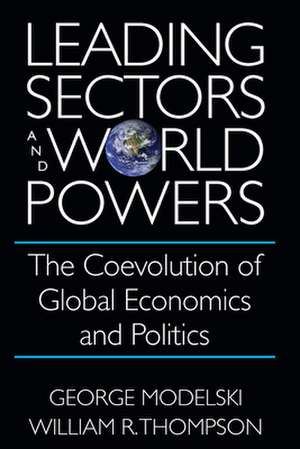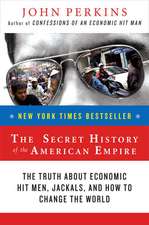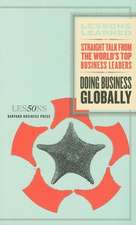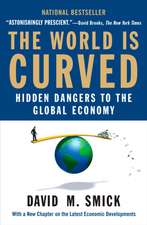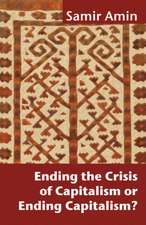Leading Sectors and World Powers: The Coevolution of Global Politics and Economics: Studies in International Relations
Autor George Modelski, George Madelski Editat de Jr. Kegley, Charles W.en Limba Engleză Hardback – 30 noi 1995
The idea that political and economic power moves in coordinated cycles has long intrigued political scientists and economists, for if such a pattern exists, a model explaining the phenomenon would gain predictive qualities. In Leading Sectors and World Powers, George Modelski and William R. Thompson venture beyond previous attempts to understand this supposition by establishing an explicit connection between war, economic innovation, and world leadership. They argue that surges in economic creativity, which in turn are tied to global war, determine leadership in the global system.
Contending that K-waves (processes delineating the wax and wane of industrial sectors) appear in paired sets correlated to long-cycle shifts (phases of world order punctuated by intensive bouts of global war), Modelski and Thompson construct a linked sequence of political-economic leadership extending from tenth-century China to the contemporary United States.
Din seria Studies in International Relations
-
 Preț: 192.70 lei
Preț: 192.70 lei -
 Preț: 185.48 lei
Preț: 185.48 lei -
 Preț: 325.93 lei
Preț: 325.93 lei -
 Preț: 436.14 lei
Preț: 436.14 lei - 49%
 Preț: 566.93 lei
Preț: 566.93 lei - 12%
 Preț: 300.49 lei
Preț: 300.49 lei -
 Preț: 433.05 lei
Preț: 433.05 lei -
 Preț: 220.76 lei
Preț: 220.76 lei -
 Preț: 284.34 lei
Preț: 284.34 lei - 17%
 Preț: 257.68 lei
Preț: 257.68 lei -
 Preț: 393.50 lei
Preț: 393.50 lei -
 Preț: 489.57 lei
Preț: 489.57 lei -
 Preț: 163.79 lei
Preț: 163.79 lei - 12%
 Preț: 312.43 lei
Preț: 312.43 lei -
 Preț: 489.10 lei
Preț: 489.10 lei -
 Preț: 379.93 lei
Preț: 379.93 lei -
 Preț: 390.96 lei
Preț: 390.96 lei -
 Preț: 434.07 lei
Preț: 434.07 lei -
 Preț: 191.16 lei
Preț: 191.16 lei -
 Preț: 283.80 lei
Preț: 283.80 lei - 27%
 Preț: 909.12 lei
Preț: 909.12 lei -
 Preț: 352.39 lei
Preț: 352.39 lei
Preț: 381.48 lei
Nou
72.100€ • 76.41$ • 60.76£
Carte tipărită la comandă
Livrare economică 31 martie-14 aprilie
Specificații
ISBN-10: 1570030545
Pagini: 263
Dimensiuni: 157 x 233 x 24 mm
Greutate: 0.61 kg
Ediția:New.
Editura: University of South Carolina Press
Seria Studies in International Relations
